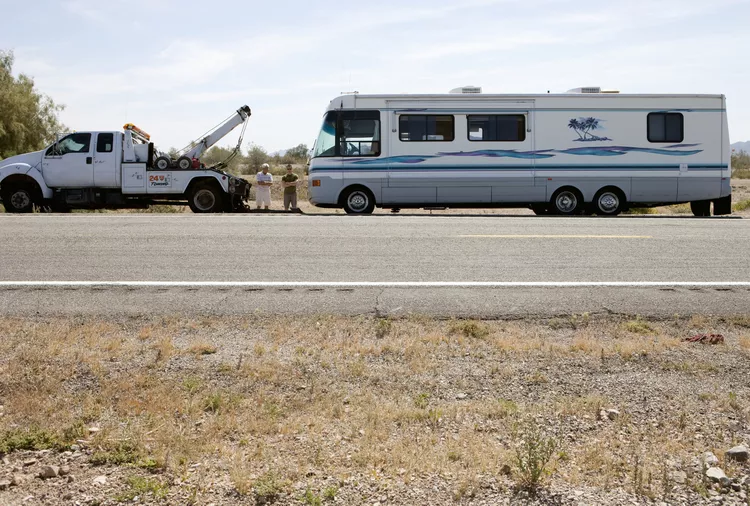Summary of Actions After an RV Accident
- Check on Yourself and Your Passenger
- Check on Anyone Else Involved in the Accident
- Move Your Vehicle and/or RV to the Side of the Road
- Make Sure to Exchange Information and Document Everything
- Call Your Insurance Agent Before You Leave the Scene
- Follow the Insurance Claims Process from Your Agent
- Take Your Vehicle and RV in for an Inspection
- Have Your Hitch Inspected and/or Replaced
- Can You Avoid an RV Accident?
Accidents are a common occurrence on the road. Whether traveling to work or on a vacation, being involved in a car accident is almost inevitable, including when RVing. Experiencing an accident while RVing can be particularly frightening. This guide will outline what to do during and after an RV accident, ensuring you, your family, and your RV are prepared for your next adventure.
Check on Yourself and Your Passenger
- After your vehicle or RV comes to a stop, check on yourself and your passengers. Ensure everyone is okay and can safely exit the vehicle or trailer.
- If you can exit, do so; if not, call 911 and wait for assistance.
- Do not attempt to move anyone who is injured unless they are in immediate danger, such as from a fuel leak, fire, or smoke.
Check on Anyone Else Involved in the Accident
- Once you confirm everyone is okay on your end, call 911 or the police if not already done. Even in minor RV accidents, police assistance is essential for getting back on the road or for towing.
- If there are other vehicles involved, check on others at the scene and provide assistance if it’s safe and possible to do so.
Move Your Vehicle and/or RV to the Side of the Road
- If it’s safe to move your vehicle and/or RV to the side of the road, do so. If unsure, it is better not to move it. If towing a trailer, do not attempt to move the RV, as you risk losing the trailer.
- Wait for police or emergency vehicles to arrive at the roadside. If carrying propane, gasoline, or another fuel, keep a safe distance from the RV while waiting for help.
- Turn on your hazard lights or place warning triangles or flares around your vehicle to alert other drivers.
Make Sure to Exchange Information and Document Everything
Exchange vehicle and insurance information with other involved parties before or after the police arrive. Document as much information about the incident as possible and take pictures if it’s safe to do so. Capture images of your RV, your vehicle, and any other vehicles involved. Create diagrams and use your insurance’s digital tools to note even the smallest details for future reference.
Call Your Insurance Agent Before You Leave the Scene
It’s crucial to contact your insurance agent before leaving the accident scene. They can provide valuable advice and information you may forget in the heat of the moment.
Follow the Insurance Claims Process from Your Agent
Filing an insurance claim for an RV accident differs from that for a car or other vehicles. The nature of the accident, the type of damages, and whether injuries occurred will influence how your claims are handled. Collaborate closely with your insurance agent from start to finish to determine the appropriate steps for filing claims and managing out-of-pocket expenses effectively.
Take Your Vehicle and RV in for an Inspection
Have a reputable mechanic or service center inspect your vehicle and/or RV without delay. Early verification of any damage—inside or outside—will help you provide necessary information to your insurance agent for coverage initiation.
Pro Tip: Visible damage isn’t the only concern. If you suspect any issues, don’t postpone the inspection. Delaying could jeopardize your ability to claim insurance for undiscovered damages.
Have Your Hitch Inspected and/or Replaced
Post-accident, it’s vital to have your hitch system inspected and possibly replaced based on the accident’s severity. Hitches are not designed to withstand the impacts of accidents and can suffer unseen damage, leading to safety risks like trailer sway. Therefore, ensure this is thoroughly checked before your next journey.
Can You Avoid an RV Accident?
While you can take preventative measures, avoiding an RV accident is never completely foolproof. Various factors, including actions from other drivers or situations beyond your control, could lead to an accident. When RVing, handling an oversized vehicle or towing something adds complexity and risk. Therefore, improving your RV driving and towing skills, adhering to road rules, and staying aware of your surroundings are essential strategies for reducing the likelihood of an accident.
In the unfortunate situation of being in an RV accident, remember to take a deep breath, stay calm, and follow the aforementioned tips. This will ensure your safety and help you recover your RV, getting you back on the road swiftly.




